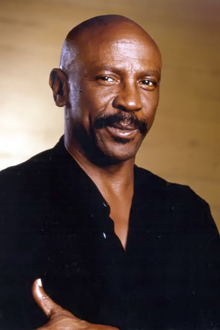Oscar-winner Gossett will speak on Hollywood racism
Actor now devoting himself to building community in the style of his Brooklyn youth

Oscar-winning veteran actor Louis Gossett Jr. will speak on racism in Hollywood and sign his newly penned autobiography. Scenes from his movies will be screened at the event, which is to take place Nov. 10 at 1 p.m. in Rapaporte Treasure Hall, Goldfarb Library.
Gossett became the first African-American man to win an Oscar for best supporting actor for his commanding role as a stern gunnery sergeant in the cinematic blockbuster, “An Officer and a Gentleman.” He also won an Emmy Award for his role in the groundbreaking television mini-series “Roots.”
Gossett's autobiography, “An Actor and a Gentleman,” co-written with Phyllis Karas, chronicles the difficulties he encountered as a critically acclaimed African American actor trying to land leading roles, his subsequent drug addiction and recovery, and his later work — driven by his own childhood exposure to Jewish life — to help at-risk children.
Gossett has a nearly life-long connection — of sorts — to Brandeis.
“Believe it or not, more than 50 years ago, Brandeis offered Mr. Gossett a full undergraduate scholarship,” says Florence George Graves, founding director of the Schuster Institute for Investigative Journalism, which is one of the sponsors of the event. “He chose instead to remain in New York to take advantage of the city’s acting opportunities, but we’re glad to welcome him to the community now. We’re honored that such an eminent star will share with us his new life’s work of fighting racism and empowering at-risk youth.”
The 74-year-old Gossett debuted on Broadway at 17. His latest film, “The Grace Card,” is slated for release on Feb. 25, 2011. It tells the story of two Memphis police officers and their journey toward racial reconciliation.
Gossett was born in Brooklyn, N.Y. In his book he fondly remembers “my Jewish friends in Brooklyn, who had regularly disappeared into a synagogue or a yeshiva while we were growing up. At least 75 percent of them ultimately emerged into successful lives, not only professionally but, more important, in the personal sphere, as they raised their families with love and respect for learning and for one another.”
These memories of growing up surrounded by a strong community, he says, have inspired him to set up the Eracism Foundation.
“I wanted to reproduce that [Brooklyn] scene, only on a permanent basis, inside what we would call the Shamba Center," Gossett writes in his memoir. "It would be named after the Swahili word for 'farm,' a place where you plant seeds. I visualized kids helping kids the way it used to be in our neighborhoods.”
In addition to the Schuster Institute for Investigative Journalism, sponsors of the visit include the Department of African and Afro-American Studies, Department of American Studies; Brandeis Black Student Organization; Cooperative Metropolitan Ministries; Department of Anthropology; Film, Television and Interactive Media Program; Hiatt Career Center; Office of the Arts; Office of the Dean of Arts & Sciences; Office of the Provost; Osher Lifelong Learning Institute; Peace, Conflict & Coexistence Studies; Social Justice and Social Policy Program; and the Interfaith Chaplaincy.
Categories: General





